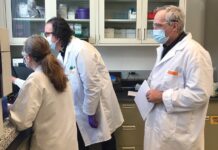
Seeking to encourage innovation that can spur job growth, President Barack Obama announced earlier this year that TechStars Network would join his Startup America Partnership. A collection of companies that help startups get off the ground, the network hopes to gather 5,000 experienced business leaders and investors to mentor 6,000 promising, young entrepreneurs.
The network has tapped Providence-based Betaspring as one of the incubators to help America reach that goal. Betaspring’s managing partner, Allan Tear, recently spoke with Providence Business News about the network and innovation in Rhode Island.
PBN: How did Betaspring become involved with the Startup America Partnership?
TEAR: Betaspring is a charter member of the TechStars Network. The TechStars Network is a group of 17 startup accelerators around the country and the globe that use mentorship as the primary means of accelerating the success of startups that participate in the programs. …
As Tech Stars was putting this network together and they were inviting the initial group of members to form the network, the White House caught wind of it. The White House said this fits really well into this initiative that we’re doing called the Startup America Partnership and we would love to have a network of accelerators that are all sharing best practices and that have a demonstrated record of success.
PBN: What got you involved with the TechStars Network?
TEAR: Startup accelerators are a relatively new phenomenon. They started about five years ago in recognition that the way in which successful startups were being created was changing. The barrier to entry was no longer access to capital or years of domain expertise. It really was access to knowledge and networks. … So accelerators are a recent response to that changing landscape and they’ve been very successful. … But we were all using similar approaches, so we realized fairly early on that we wanted to be in touch with the other accelerators, the ones that were doing exceptionally well, to share best practices with them and to create relationships.
TEAR: Our argument with Betaspring has always been to reframe the conversation about startups that are created here as startups that can compete anywhere in the country or the world and that happen to be based in Rhode Island. …
A lot of the work that we do within public-policy circles, economic-development circles and also in networking Betaspring into mainly the New England and New York communities is based around increasing the expectations of what we do and also the quality of what we do … to be nationally and globally competitive.
I think that fits very well with what we expect out of the Startup America initiative, which is not just parity but to use the assets that are unique to Rhode Island to position ourselves as a startup hub in the Northeastern corridor. And we have some particular strengths in Rhode Island.
PBN: What are those strengths? PBN: Now it’s the TechStars Network with “tech” right in its name. Are there other industries you see coming out of this that may be less glamorous than the technology the public tends to think about? INTERVIEW
TEAR: First of all, we have a … geographic advantage … being on the East Coast, being midway between Boston and New York City, being on a major highway and high-speed rail line, really being connected intimately to the Boston scene and increasingly to New York, which are the No. 2 and No. 3 hubs of technology startups outside of Silicon Valley. That’s an enormous asset that’s purely an accident of geography that most cities that are trying to undergo a startup revolution don’t have.
Building on top of that because of Rhode Island’s scale, we have this unique intersection of technology, creativity and design that, where no one of those communities is large enough to stand on its own, they’re forced to interact, so as a result we’re able to bring together technologists, creative thinkers and people who are experienced in industrial and digital design into the same place much more quickly than you might be able to in a larger community. And that’s key for particular types of high-growth startups.
TEAR: I’ll answer that question in two ways. One is that you can innovate in many different markets. One of our most successful companies is a company called New Label Technologies and they were a team out of Brown that invented a way to create high-volume labels without the sticky silicon backing, and that’s a very industrial technology. … That’s one way to look at the question.
The second way to look at that question is to say, what are other things that are technology-driven? Are there other startups that would benefit from this model that would also benefit Rhode Island, in terms of activity or job creation?
What we’re doing is we’re very open to how the model works and we work with partners as often as possible to try them out in a new place. So last year, for example, we worked with Social Venture Partners Rhode Island to launch the change accelerator, which was applying the Betaspring model to social ventures.
And they launched eight social ventures, several of which are very high-growth, globally reaching ventures. For example, there is Maternova, which is working in the area of global women’s health.
So we know the model works in different places with different kinds of entrepreneurs. •
Allan Tear
POSITION: Managing partner at Betaspring
BACKGROUND: Allan Tear is an engineer by training and worked for Nortel Networks for many years managing technology projects around the world. In the late 1990s he started becoming involved in Internet and telecommunications startups, ultimately founding four companies. He was one of the founders of Betaspring in 2009.
EDUCATION: Bachelor’s in electrical and computer engineering and a bachelor’s in public policy from Carnegie Mellon University in 1992
FIRST JOB: Newspaper delivery boy in Parkersburg, W.Va., at age 13
RESIDENCE:
Providence
AGE: 40











